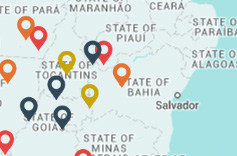Jubileu Sul Institute Brazil (São Paulo)
National Network of World Cup and Olympics Popular Committees: monitoring human rights violations and coordinating integrated actions for resistance and popular participation
São Paulo
The project will monitor human rights violations that occur in the build-up to the 2014 World Cup and 2016 Olympics; as well as expand the debate on this issue, through strengthening the National Network of World Cup Popular Committees. The proposal is to intensify the actions of committees in the twelve host-cities that will hold the events: Belo Horizonte, Brasília, Cuiabá, Curitiba, Fortaleza, Manaus, Natal, Porto Alegre, Recife, Rio de Janeiro, Salvador and São Paulo.
Among the expected initiatives are the production of a handout with information on forms of social mobilization; the development model centered around mega-events and mega-projects; the history of other sporting mega-events and their impact; and human rights violations that prevail in each city.
Furthermore, the network plans on updating the National Dossier of Human Rights Violations, which is in its second edition; produce a report on exceptional laws, sanctioned at the federal, state, and municipal levels due to mega-events, in partnership with the State, Work, Territory and Nature Laboratory — ETTERN-IPPUR; and put together a document analyzing the issue of employment and work in the context of mega-events, with a focus on the guarantee of Brazilian and foreign workers’ rights, to be delivered to the International Labor Organization (ILO).
While the project is being carried out, its resources will allow for the participation of its integrants in events, meetings and conferences relevant to the theme; and make possible the hiring of a secretary to handle bureaucratic matters.
Context
The initiative is conceptualized as a form of resistance to the rhetoric of governments, international organizations (FIFA, IOC) and companies that only highlight the possible benefits of holding the 2014 World Cup and 2016 Olympics in Brazil.
Removals and forced evictions of excluded social groups are the most common violations in Brazil and other countries that have received similar mega-events. Their perverse effects are particularly worsened by the imposition, on the part of authorities and promotional committees, of an actual “state of exception,” instituted especially in this context. Flexibility of laws and suspension of rights before and during the games threaten mechanisms of defense, social protection and the guarantee and promotion of human rights.
Until now it hasn’t been evident that the legacy of holding these games is a minimal contribution of social inclusion or expansion of social, economic, cultural and environmental rights. On the contrary, the lack of dialog and transparency of investments highlights a repetition of what occurred during the 2007 Pan-American Games, when there was a great wasting of public resources on overcharged projects that became white elephants and, as bad or worse, the abandoning of all the “promises” made to society, expectations of some “social legacy.” The international experience also demonstrated similar impacts, overall on the poorest and most vulnerable people.
Popular Committees
One form of reaction to the model imposed has been the formation, over the last two years, of Popular World Cup Committees in the cities selected to host games. An initiative of those impacted, the committees represent a space for popular mobilization and strong, critical and propositional challenge to regain the rights of our cities and their populations, as a whole, to utilize the investments made. The committees are organized nationally through the National Network of Popular World Cup Committees.
Proponent organization
Jubileu South Institute Brazil, through its legal entity, will administer the resources of the proposed project and is co-responsible for the realization of its activities. The development of the project itself falls to the National Network of Popular World Cup Committees.
The proponent network is made up of social movements, popular and religious organizations, along with Latin American and Caribbean, African and Asian campaigns that have worked to develop a global movement to cancel and repudiate external debt and internal debt and demand reparation and restitution for the immense harm caused in indebted countries and to the human, social, environmental, political and economic development thereof.
Since 2010, the network has contributed to the debate, reflection, mobilization and organization of the Popular World Cup Committees and is one of the organizations responsible for the national network.
Funding Line
Urban Development (2012)
Year
-
Total Granted
-
Duration
-
Main Themes
The right to just and sustainable cities






